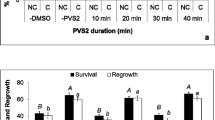Abstract
We report a straightforward and widely applicable cryopreservation method for Lilium shoot tips. This method uses adventitious shoots that were induced from leaf segments cultured for 4 weeks on a shoot regeneration medium containing 1 mg/l α-naphthaleneacetic acid and 0.5 mg/l thidiazuron. Shoot tips (1.5–2 mm in length) including 2–3 leaf primordia were precultured on Murashige and Skoog (MS; 1962) medium with 0.5 M sucrose for 1 day and then treated with a loading solution containing 0.4 M sucrose and 2 M glycerol for 20 min, followed by a Plant Vitrification Solution 2 (PVS2) treatment for 4 h at 0 °C. Dehydrated shoot tips were transferred onto 2.5 µl PVS2 droplets on aluminum foil strips, prior to a direct immersion into liquid nitrogen for 1 h. Frozen shoot tips were re-warmed in MS medium containing 1.2 M sucrose for 20 min at room temperature, followed by post-thaw culture for shoot regrowth. Shoot regrowth levels ranged from 42.5 % for L. longiflorum × Oriental ‘Triumphator’ to 87.5 % for L. Oriental hybrid ‘Siberia’, with a mean shoot regrowth level of 67.1 % across the six diverse Lilium genotypes tested. Histological observations found that the survival patterns were similar in cryopreserved shoot tips of ‘Triumphator’ and ‘Siberia’. Assessments using inter-simple sequence repeat markers found no differences in regenerants recovered from the control stock cultures and from cryopreserved shoot tips in ‘Triumphator’ and ‘Siberia’. This Lilium droplet-vitrification cryopreservation method is efficient, simple and widely applicable for the long-term conservation of lily genetic resources.








Similar content being viewed by others
Abbreviations
- NAA:
-
α-Naphthaleneacetic acid
- TDZ:
-
Thidiazuron
- MS:
-
Murashige and Skoog (1962)
- PVS2:
-
Plant Vitrification Solution 2
- ISSR:
-
Inter-simple sequence repeat
- SMM:
-
Shoot maintenance medium
- BM:
-
Basal medium
- BA:
-
6-Benzylaminopurine
- LPs:
-
Leaf primordia
- DMSO:
-
Dimethylsulfoxide
- LN:
-
Liquid nitrogen
- RM:
-
Rooting medium
- AC:
-
Activated charcoal
- FAA:
-
Formaldehyde acetic acid fixative
- TB:
-
Toluidine blue
- AD:
-
Apical dome
References
Bacchetta L, Remotti PC, Bernardini C, Saccardo F (2003) Adventitious shoot regeneration from leaf explants and stem nodes of Lilium. Plant Cell Tissue Organ Cult 74:37–44
Benson EE (2008) Cryopreservation of phytodiversity: a critical appraisal of theory & practice. Crit Rev Plant Sci 27:141–219
Bhojwani SS, Razdan MK (1996) Plant tissue culture: theory and practice. Elsevier, Amsterdam
Bouman H, de Klerk GJ (1990) Cryopreservation of lily meristem. Acta Hortic 266:331–337
Bouman H, Tiekstra A, Petutschnig E, Homan M, Schreurs R (2003) Cryopreservation of Lilium species and cultivars. Acta Hortic 612:147–154
Chen XL, Li JH, Xin X, Zhang ZE, Xin PP, Lu XX (2011) Cryopreservation of in vitro-grown apical meristems of Lilium by droplet-vitrification. S Afr J Bot 77:397–403
Chinestra SC, Facchinetti C, Curvetto NR, Marinangeli PA (2010) Detection and frequency of lily viruses in Argentina. Plant Dis 94:1188–1194
Compton ME (1994) Statistical methods suitable for the analysis of plant tissue culture data. Plant Cell Tissue Organ Cult 37:217–242
Godo T, Mii M (2001) In vitro germplasm preservation of lily species utilizing callus cultures at low temperature. Acta Hortic 560:153–155
Harding K (2004) Genetic integrity of cryopreserved plant cells: a review. Cryo Lett 25:3–22
Helliot B, Panis B, Poumay Y, Swennen R, Lepoivre P, Frison E (2002) Cryopreservation for the elimination of cucumber mosaic and banana streak viruses from banana (Musa spp.). Plant Cell Rep 20:1117–1122
Helliot B, Swenen R, Poumay Y, Frison E, Lepoivre P, Panis B (2003) Ultrastructural changes associated with cryopreservation of banana (Musa spp.) highly proliferating meristems. Plant Cell Rep 21:690–698
Kim HH, Lee YG, Park SU, Lee SC, Baek HJ, Cho EG, Engelmann F (2009) Development of alternative loading solutions in droplet-vitrification procedures. Cryo Lett 30:291–299
Maslanka M, Panis B, Bach A (2013) Cryopreservation of Galanthus elwesii Hook. Apical meristem by droplet vitrification. Cryo Lett 34:1–9
Matsumoto T, Sakai A, Yamada K (1995) Cryopreservation of in vitro-grown apical meristems of lily by vitrification. Plant Cell Tissue Organ Cult 41:237–241
Murashige T, Skoog F (1962) A revised medium for rapid growth and bioassays with tobacco cell cultures. Physiol Plant 15:473–497
Nhut DT, Van Le B, Van KTT (2001) Manipulation of the morphogenetic pathways of Lilium longiflorum transverse thin cell layer explants by auxin and cytokinin. In Vitro Cell Dev Biol Plant 37:44–49
Sakai WS (1973) Simple method for differential staining of paraffin embedded plant material using toluidine blue O. Biotech Histochem 48:247–249
Sakai A, Kobayashi S, Oiyama I (1990) Cryopreservation of nucellar cells of navel orange (Citrus sinensis Osb. var. brasiliensis Tanaka) by vitrification. Plant Cell Rep 9:30–33
Scowcroft WR (1984) Genetic variability in tissue culture: impact on germplasm conservation and utilization. IBPGR, Rome, Italy
Wang QC, Valkonen JPT (2009) Cryotherapy of shoot tips: novel pathogen eradication method. Trends Plant Sci 14:119–122
Wang QC, Panis B, Engelmann F, Lambardi M, Valkonen JPT (2009) Cryotherapy of shoot tips: a technique for pathogen eradication to produce healthy planting materials and prepare healthy plant genetic resources for cryopreservation. Ann Appl Biol 154:351–363
Wang B, Zhang ZB, Yin ZF, Feng CH, Wang QC (2012) Novel and potential application of cryopreservation to plant genetic transformation. Biotech Adv 30:604–612
Yin ZF, Zhao B, Bi WL, Chen L, Wang QC (2013) Direct shoot regeneration from basal leaf segments of Lilium and assessment of genetic stability in regenerants by ISSR and AFLP markers. In Vitro Cell Dev Biol Plant 49:333–342
Acknowledgments
The present study is financially supported by the President Foundation of Northwest A&F University, China.
Author information
Authors and Affiliations
Corresponding author
Additional information
Communicated by B. Borkowska.
Rights and permissions
About this article
Cite this article
Yin, ZF., Bi, WL., Chen, L. et al. An efficient, widely applicable cryopreservation of Lilium shoot tips by droplet vitrification. Acta Physiol Plant 36, 1683–1692 (2014). https://doi.org/10.1007/s11738-014-1543-7
Received:
Revised:
Accepted:
Published:
Issue Date:
DOI: https://doi.org/10.1007/s11738-014-1543-7




